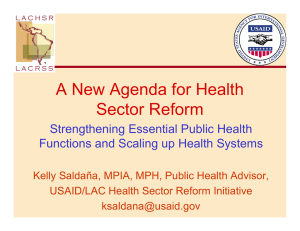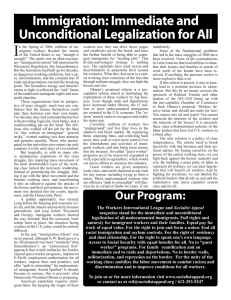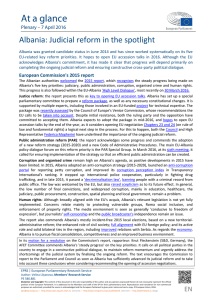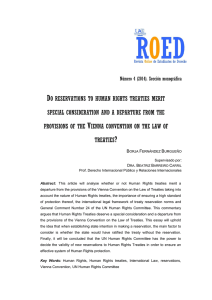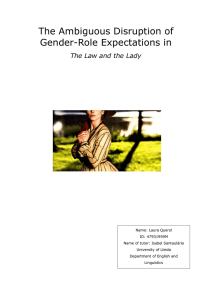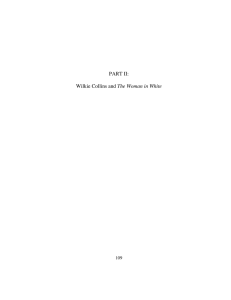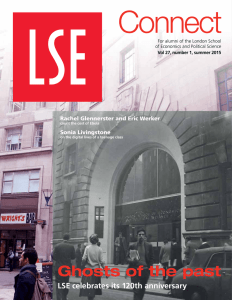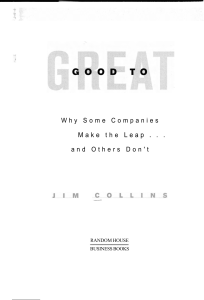Reform Options for UNGASS and Beyond - Friedrich-Ebert
Anuncio
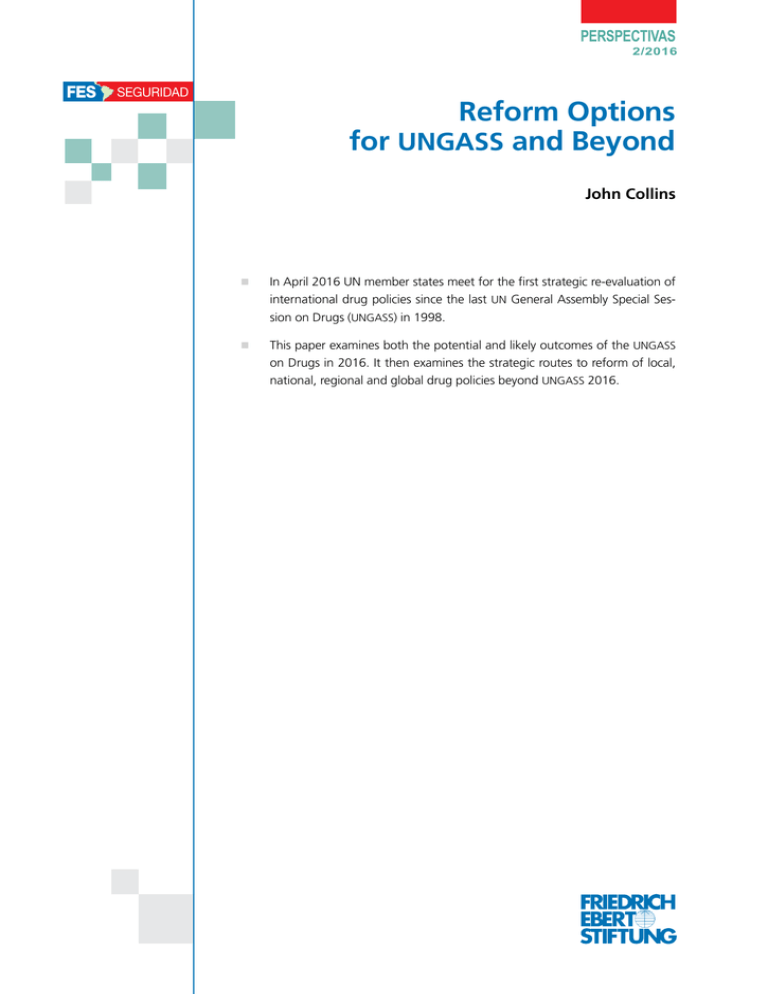
perspectivas 2/2016 Reform Options for UNGASS and Beyond John Collins nn In April 2016 UN member states meet for the first strategic re-evaluation of international drug policies since the last UN General Assembly Special Session on Drugs (UNGASS) in 1998. nn This paper examines both the potential and likely outcomes of the UNGASS on Drugs in 2016. It then examines the strategic routes to reform of local, national, regional and global drug policies beyond UNGASS 2016. Contents Introduction............................................................................................................................... 5 Key Short-Term Routes to Global Reform – Resource Reallocation...................................... 8 Key Medium-Term Routes to Global Reform – Treaty Flexibilities........................................ 8 Frameworks for Flexibility on Regulated Markets................................................................. 9 Conclusion: Next Steps........................................................................................................... 11 Bibliography............................................................................................................................ 12 Reform Options for UNGASS and Beyond | John Collins Introduction are accepted while “tensions” with the treaties are discussed, ironed out, or possibly just ignored. Hopes I have argued elsewhere that these “flexibility frameworks” will provide room to change the entire global drug policy landscape via targeted shifts at local, national and regional levels. They offer not only the prospect of bettering the lives of millions but also providing the empirical basis for major reforms at the international and even treaty levels. Under these circumstances, newly emerging evidence of efficacy around alternatives will likely provide the best method to counteract the continuation of repressive policies globally. They, therefore, and on balance, as this paper will argue, offer the clearest hope for a positive outcome in UNGASS and beyond1. My hope for UNGASS 2016 would be an open debate whereby the massive failings of current approach is recognised and a new effort to reformulate local, national, regional and global policies is begun with a parallel process to codify a new set of conventions to govern the accompanying framework. That, with virtually absolute certainty, will not happen. Likely outcomes Others disagree and have suggested “flexibility frameworks” fall afoul of strict readings of the treaties; deflate the overarching goal of treaty reform; are a means to paper over inconsistencies and hypocrisies by lead member states such as the US; and pose too high a cost in terms of respect for international law2. The likely outcome is that member states will publicly affirm a commitment to the UN Conventions on drugs and to “shared” responsibility to tackle the world drug problem, albeit with a new normative foundation in, at least nominal, reference to human rights and public health. Member states will then likely shift this issue to the backburner and refocus on other issues which will prove less divisive and inflammatory to the complex regional institutional structures. Drug policy will then, likely, remain on autopilot up to and possibly beyond the new 2019 date which is increasingly highlighted as the next “major step” in global reform. Leaving these debates on “flexibility doctrines” aside, this paper focuses on likely outcomes and what this author views as potential routes to reform. Dissecting the Derailing of UNGASS In June 2013 at the height of global reform rhetoric and the emergence of a coherent reform bloc in the Beneath the surface, however, the real shift seems likely to occur. Member states, while affirming a consensus strategy will in fact allow the opening up of broad flexibility frameworks for implementing the current treaties. These will allow member states to examine and experiment with reforms, before committing to anything which can be construed as examining treaty reforms. Under these “flexibility frameworks” (see below), a range of policies which previously seemed unthinkable, for example the legal regulation of cannabis, the broad decriminalisation of consumption practices and the decriminalisation of the production end of the commodity chain, 5 1 John Collins, “The State Department’s Move to a More Flexible Diplomatic Policy on Drugs Is a Rational Approach to a Difficult Question”, LSE USAPP, December 1, 2014, http:// blogs.lse.ac.uk/usappblog/2014/12/01/the-u-s-new-moreflexible-diplomatic-doctrine-on-drugs-is-a-rational-approach-to-a-difficult-question/. 2 Damon Barrett, David Bewley-Taylor, and Martin Jelsma, “Fatal Attraction: Brownfield’s Flexibility Doctrine and Global Drug Policy Reform”, Huffington Post Politics UK, November 18, 2014, http://www.huffingtonpost.co.uk/damon-barett/ drug-policy-reform_b_6158144.html. John Collins | Reform Options for UNGASS and Beyond Americas under the leadership of Mexico, Colombia and Guatemala, the UN Secretary General called for “a wide-ranging and open debate that considers all options”3. Previously, in October 2012 President Juan Manuel Santos of Colombia had called for a systematic rethink of global drug policies highlighting that: 1. If the system could be reformed by de facto rather than de jure means; The Colombian Government strongly believes that the time has come to take a fresh look and we invite world leaders, scientists and experts to start an open, serious and honest debate about this war. The time has come to think outside the box. Our invitation is to dutifully study new formulas and approaches screened through an academic, scientific and non-politicised lens, because this war has proven to be extremely challenging and oftentimes, highly frustrating4. 3.If wavering adherence to the control system could add new pressure for additional resources from interested states such as the US to tackle issues seen as important to producer and transit countries. 2. If the system could serve as a mechanism to readjust regional institutional alignments for a variety of issues by exploiting the drug issue as a geopolitical wedge issue; Meanwhile, the top level appraisal of treaty issues was summed up by one senior Latin American political leader in 2014: “we examined the treaties closely and concluded there is nothing in them which requires a “war on drugs”5. The seeds of such an outcome were apparent in early statements, even, for example, President Santos’ where broad aspirations were anchored by an awareness of political overlap and he warned: “[t]his is a global problem that demands a global solution, and therefore a new international consensus is needed”6. Civil society was encouraged and hoped for a full ranging debate which would break open the holy grain of global drug policy: rewriting the UN Drug Conventions. Some member states appeared willing to push a hard-line reform agenda and the idea of written treaty reforms was countenanced. However, member states soon faced a choice: shift policies by (1) circumventing the conventions or (2) engaging in a monumental diplomatic process that risked rupturing the global control system and a plethora of other issues, linked via byzantine international institutional structures and politics. While many argued normative, legal and moral imperatives for treaty rewriting, Latin American governments, while leading the debate, appear to have done so for a variety of reasons including: geopolitics, national self-interest, diplomatic manoeuvring, pragmatism, a desire to pursue effective and evidence-based policies and, sometimes, personal idiosyncrasies. In other cases, a deflating reform impetus derived from a hierarchy of priorities. For example, Colombia clearly subsumed international drug policy reform to its delicate peace process, hence removing the ability, even if the will existed, for Colombia to take any functional international lead. The tendency towards option (1) was only reinforced when one or more of the following factors seemed present: 3 Ban Ki-moon, “Secretary-General’s Remarks at Special Event on the International Day against Drug Abuse and Illicit Trafficking” (New York, June 26, 2013), http://www.un.org/sg/ statements/index.asp?nid=6935. 4 Juan Manuel Santos, “Re-Examining the Drug Problem Through a Fresh Lens”, ed. John Collins, Governing the Global Drug Wars, LSE IDEAS Special Reports, October 2012, http://www.lse.ac.uk/IDEAS/publications/reports/pdf/SR014/ SR-014-FULL-Lo-Res.pdf. 6 5 Paraphrase of private discussions at the London School of Economics. 6 Santos, “Re-Examining the Drug Problem Through a Fresh Lens”. Reform Options for UNGASS and Beyond | John Collins The US, on the other hand, demonstrating a key precept of Thucydides that “the strong do what they can and the weak suffer what they must”7, shifted their interpretation of the international treaties, when their hypocrisy of implementation became apparent around cannabis legalisation. Further, in moments of bluntness, State Department officials have openly asserted national sovereignty tempered by a need to defuse international criticisms8. The hypocrisy only became more apparent as the International Narcotics Control Board (a treaty body with an abysmal human rights record)9 publicly castigated Uruguay for its national regulatory efforts around cannabis while seeming to avoid direct confrontation with the US10. anti-public health policies – for example seeking to build an anti-methadone coalition in time for UNGASS 201612. Despite these realities, some civil society groups remain focused on treaty reforms. Some maintain that: “because member states won’t openly discuss treaty reform, this shows they recognise the eventual need for treaty reform”13. As International Relations scholar Hans Morgenthau once wrote: “it is inevitable that a theory which tries to understand international politics as it actually is…rather than as people would like to see it, must overcome a psychological resistance that most other branches of learning need not face”14. Simultaneously, a number of other “flexibility frameworks” emerged to deflate the conventions’ obstacle to reforms. Europe, while expressing discomfort with overtly highlighting international legal instruments as “flexible,” sought to downplay the debate and keep it off their policy agenda. Asia, meanwhile, has sought a path of “steady as she goes” on the “war on drugs,” with ASEAN nations continuing As we approach UNGASS a realistic appraisal of likely outcomes, expectations and goals is appropriate as the reform community decides where to direct efforts next. If the goal is to establish a clear process of convention reform, that process seems virtually certain to fail. If the goal is to establish a set of covert processes to break open convention reform later, that goal seems plausible but extremely unlikely, given member states’ awareness that anything other than full-throated support for the conventions will be read as an invitation to rewrite them – something virtually all express strong or even visceral opposition to. If the goal is to buy some time to change national policies by deferring to interpretational complications and “flexibilities”, then that seems entirely likely and, I would posit, the best strategy for reforming national, regional and eventually, international drug policies while treaty debates play out. the “drug free world” pursuit11. Russia, pursuing the maxim of “offence is the best defence,” has grappled with building repressive coalitions around 7Thucydides, The History of the Peloponnesian War, trans. Richard Crawley (The Internet Classics Archive, 431AD), http://classics.mit.edu/Thucydides/pelopwar.mb.txt, Chapter XVII. 8 9 Remarks by William Brownfield at: Centre for International and Strategic Studies, What’s Happening in U.S. Drug Policy at Home and Abroad?, accessed October 1, 2015, http:// csis.org/event/whats-happening-us-drug-policy-home-andabroad. Joanne Csete, “Overhauling Oversight: Human Rights at the INCB”, ed. John Collins, Governing the Global Drug Wars, LSE IDEAS Special Reports, October 2012. 12 Helena Forrester, “Russia Seeks International Anti-Methadone Coalition Ahead of UNGASS”, Talking Drugs, August 20, 2015, http://www.talkingdrugs.org/russia-seeks-international-anti-methadone-coalition-ahead-of-ungass-0. 10 Buenos Aires Herald.Com, “Mujica Blasts UN Official Raymond Yans over Marijuana Law”, December 15, 2013, http://www.buenosairesherald.com/article/147539/mujicablasts-un-official-raymond-yans-over-marijuana-law. 13 Private discussions. 14 Hans J. Morgenthau, Politics Among Nations: The Struggle for Power and Peace, Fifth Edition (New York: Alfred A. Knopf, 1978), 4–15, https://www.mtholyoke.edu/acad/intrel/morg6.htm. 11 ASEAN, “ASEAN Leaders’ Declaration on Drug-Free ASEAN 2015”, April 3, 2012, http://www.asean.org/archive/documents/Declaratin%20on%20Drug%20Free%20ASEAN_Endorsed%20by%20Summit_FINAL.pdf. 7 John Collins | Reform Options for UNGASS and Beyond Key Short-Term Routes to Global Reform – Resource Reallocation 6. Avoid or reduce drug related incarceration. The key to short-term changes in drug policy rest with national and regional policy changes which can then percolate up to the international level. 8. Scale up public health and harm reduction responses to consumption. 7. Recognise that drugs is a development issue, not an “alternative development” issue. 9. Experiment with regulation and enact strict regulations to prevent commercialisation, maintain high prices and minimise access. Framework for Improving Global Drug Policy in the short term15: 1. Improve multilateral efforts by recognising the goal of multilateralism is not simply market reduction. Goal is to manage global drug issues. Key Medium-Term Routes to Global Reform – Treaty Flexibilities 2. Contain supply and consumption by focusing on global price effect, i.e. ensuring that price inflation is assisted at targeted points on the commodity chain and minimising spill off into transit The key to long term treaty reform is to use medium term flexibilities to shift political realities to such an extent that treaty rewriting ceases being an intellectual exercise and becomes one driven by hard diplomatic and economic forces. Then the reform community can cease prognosticating on abstract legal possibilities and hand the issue off to Foreign Ministries with their background in and resource for hammering out complex international agreements. markets. In other words, focus on interdicting drugs at points which raise consumer country prices the most and lessen them on points which raise them the least. 3. Begin to quantify externalities and cost displacement of policies, especially for producer and transit countries. Factor this into regional and UN level discussions. In the meantime states need to continue shifting the locus of control from the UN-centric, prohibitionist 4.Factor market and commodity chain displacement (the “balloon effect”) into illicit market management strategies. framework, to a new one based on evidence, supremacy of human rights, respect for national sovereignty and general post-prohibition principles. 5. Shift to targeted supply-side strategies. Focus on new metrics of reducing violence and corruption while increasing population security. Avoid simplistic targets of commodity flow reduction. Previously UN drug treaties have been viewed as mandating absolute, unconstrained and symmetric prohibitionist policies around the recreational use of certain controlled substances. Now, as US Assistant Secretary of State for the Bureau of International Narcotics and Law Enforcement Affairs, Ambassador William Brownfield stated: 15 This framework is drawn from John Collins; Jonathan P. Caulkins; Daniel Mejia and Pascual Restrepo; Peter Reuter; Vanda Felbab-Brown; Laura H. Atuesta-Becerra; Alejandro Madrazo Lajous; Ernest Drucker; Joanne Csete; Mark A. R. Kleiman and Jeremy Ziskind in John Collins, ed., Ending the Drug Wars: Report of the LSE Expert Group on the Economics of Drug Policy (The London School of Economics and Political Science, 2014), http://www.lse.ac.uk/IDEAS/Projects/IDPP/ The-Expert-Group-on-the-Economics-of-Drug-Policy.aspx. Things have changed since 1961. We must have enough flexibility to allow us to incorporate those changes into our policies … to tolerate different national drug policies, to accept the fact that some 8 Reform Options for UNGASS and Beyond | John Collins Frameworks for Flexibility on Regulated Markets20 countries will have very strict drug approaches; other countries will legalize entire categories of drugs16. This reinterpretation of purposive goals, resource constrains and normative underpinnings is part of an ongoing evolutionary process of the global drug regulatory framework17. There is no single mechanism to define the boundaries of the treaties. Member states must instead decide whether the national regulatory systems they enact remain “in good faith in accordance with the ordinary meaning” of the treaties, as mandated by the Vienna Convention on the Law of Treaties18. Resource/Capacity Limitations: Selective Enforcement Model This framework derives from legal complications around enforcing the treaties in a federal political system. The United States remains the test case. The federal government is the signatory to the UN drug control treaties and is their executor. US states have not. The federal government has no constitutional authority to force states to implement the treaties. The federal government only has the authority to directly enforce the treaties in states via federal resources. Meanwhile, as Mark Kleiman and Jeremy Ziskind note: “The places that legalise cannabis first will provide – at some risk to their own populations – an external benefit to the rest of the world in the form of knowledge, however the experiments turn out… [t]he guardians of the international treaty regimes would be well advised to keep their hands off as long as the pioneering jurisdictions take adequate measures to prevent ‘exports’”19. The US State Department has argued this would place an excessive burden on federal resources and is therefore not consonant with a realistic interpretation of the drug control treaties. Further, the drug control treaties make repeated and specific mention of “constitutional limitations” as a mitigating factor around implementing a number of their clauses. For example, Article 35 of the 1961 Single Convention includes the preface: ‘Having due regard to their constitutional, legal and administrative systems the Parties shall…’21. The US State Department has offered a four-point framework for continuing international cooperation around drug policy, whilst allowing increasing variation in national policies22: 16 William R. Brownfield, “Trends in Global Drug Policy” (New York City, October 9, 2014), http://fpc.state.gov/232813. htm. 17 John Collins, “Regulations and Prohibitions: Anglo-American Relations and International Drug Control, 1939-1964” (London School of Economics and Political Science (LSE), 2015), http://etheses.lse.ac.uk/3107/. 20 This framework first appeared in: UK All Party Parliamentary Group on Drug Policy Reform, “Guidance on Drug Policy: Interpreting the UN Drug Conventions”, 2015, http://www. thetimes.co.uk/tto/multimedia/archive/00960/Guidance_ print_copy_960637a.pdf. 18 Vienna Convention on the Law of Treaties, 1969, Art. 31. 19 Mark A.R. Kleiman and Jeremy A. Ziskind, “Lawful Access to Cannabis: Gains, Losses and Design Criteria”, in Ending the Drug Wars: Report of the LSE Expert Group on the Economics of Drug Policy, ed. John Collins (The London School of Economics and Political Science, 2014), http://www.lse. ac.uk/IDEAS/Projects/IDPP/The-Expert-Group-on-the-Economics-of-Drug-Policy.aspx. 21 Single Convention on Narcotic Drugs, 1961, Art. 35. 22 Collins, “The State Department’s Move to a More Flexible Diplomatic Policy on Drugs Is a Rational Approach to a Difficult Question”. 9 John Collins | Reform Options for UNGASS and Beyond 1. Defend the integrity of the core of the conventions. Uruguay has provided a systematic elaboration of this argument. The Uruguayan Ministry of Foreign Affairs wrote to the International Narcotics Control Board (INCB) in February 201425: 2. Allow flexible interpretation of treaties. 3. Allow different national/regional strategies. The Uruguayan State is an absolute defender of international law. In that sense, it has a comprehensive view of the law and obligations assumed by the country not only in the sphere of the Drug Conventions of 1961, 1971 and 1988, but also in the field of the protection of human rights… 4. Tackle organised crime. Other federalist jurisdictions have faced similar issues. In the case of Spain, a 2013 report by RAND highlights that 23. Following several Supreme Court rulings, the possession and consumption of cannabis is no longer considered a criminal offence, and the jurisprudence in the field has tended to interpret the existing legislation in a way that permits ‘shared consumption’ and cultivation for personal use when grown in a private place. While there is no additional legislation or regulation defining the scale or particulars under which cultivation could be permitted, the Cannabis Social Club (CSC) movement has sought to explore this legal space, reasoning that if one is allowed to cultivate cannabis for personal use and if ‘shared consumption’ is allowed, then one should also be able to do this in a collective manner. In this context, hundreds of CSCs have been established over the past 15 years, but legal uncertainty around the issue of production continues. It is important for Uruguay to remark the following: (i) The object and purpose of the Convention on Narcotic Drugs, especially the 1988 Convention, should be combating illicit trafficking and, in particular, combating the harmful effects of drug trafficking… (ii) All the measures adopted to put this combat into practice must neither contradict the Uruguayan Constitution nor ignore or leave fundamental rights unprotected. (iii)The obligations that our State, as well as other State parties, have assumed under other Conventions, must be taken into account, in particular those related to the protection of human rights, since they constitute jus cogens [“compelling law”] and cannot be ignored. Supremacy of Human Rights Treaties over Drug Control Treaties (iv)…given two possible interpretations of the provisions of the Convention, the choice should be for the one that best protects the human right in question, as stated in Article 29 of the American Convention on Human Rights…In this context and on the basis of the above interpretation, we believe that production and sale in the manner prescribed in the new law may be the best way, on the one hand, to combat drug trafficking, and on the other, to defend the constitutionally protected right to freedom of our fellow citizens. Human rights obligations are a part of the UN Charter. Obligations derived from the drug control treaties are subordinate to human rights obligations. As the UN Charter explicitly states, “in the event of a conflict between the obligations of the Members of the United Nations under the present Charter and their obligations under any other international agreement, their obligations under the present Charter shall prevail”24. 23 Beau Kilmer et al., “Multinational Overview of Cannabis Production Regimes” (RAND Europe, 2013), x. 25 “Señor Subsecretario Del Ministerio de Relaciones Exteriores Ante JIFE”, February 4, 2014, http://www.bvcedro.org.pe/ bitstream/123456789/543/9/4377-DR-CD.pdf. 24 United Nations Charter, Ch. XVI, Art 103. 10 Reform Options for UNGASS and Beyond | John Collins Expanded Definition of “Medical and Scientific” via Experimentation today. An inflection point occurred over the last decade which drove global drug policies more quickly towards a new normative international framework. The complex political, economic and power political forces which buttress the system have begun to shift, but the case of UNGASS appears to demonstrate that change will be evolutionary not transformative; ad hoc, messy and legally ambiguous at times, not clear, coherent and legalistic. This is as one would expect with any issue of international relations. As the commentary on the 1961 Single Convention states, “The object of the international narcotics system is to limit exclusively to medical and scientific purposes the trade in and use of controlled drugs”26. The Commentary on the Single Convention states that “the term “medical purposes” does not necessarily have exactly the same meaning at all times and under all circumstances”27. Prior to 1961 an ar- In the years 2008-13/4 the UN served as a useful forum for driving a change in the normative underpinnings of global drug policies. By exposing the contradictions between the UN’s approach to drug policy and broader approaches to human rights, development and public health (most notably in the field of HIV) significant shifts in language and understandings of drug policy occurred. These changes have been internalised by CND, UNODC and its corresponding bodies. Member states now openly laud human rights and public health and assert this as the normative goal of the UN. While the international community has absorbed the language of reform, they have generally avoided major shifts in budgets and policies. To tackle this latter issue now requires a shift in emphasis by the reform community. For a start the debate needs to move beyond international forums and focus on changing national and regional funding and policy efforts. This requires a different set of advocacy and policy inputs than those geared towards shifting the normative framework of the UN. ray of states counted “quasi-medical” consumption via state regulated opium eating and smoking28. Although this has ceased, it highlights the continued evolutionary process of convention interpretation. For example, one personal legal opinion by a senior UK legal figure, solicited for a recent UK APPG Guid- ance, concluded that: “it would fall within the Conventions for a contracting State to produce a regulated market, preferably for a limited period subject to evaluation at the end of that period, as long as there was a clear medical or scientific basis for such evaluation”29. Other experts disagree, but the issue remains one of national interpretation. Conclusion: Next Steps A myriad of political, diplomatic, economic, realpolitik, irrational, moral and legion other forces have brought international drug policy to the point it is The current reform strategy seems based on the goal of legal and empirical logic forcing member states to re-evaluate the current international system, thereby trickling down to member state level as the UN be- 26 United Nations, “Commentary on the Single Convention on Narcotic Drugs, 1961” (New York, 1973), https://www. unodc.org/documents/treaties/organized_crime/Drug%20 Convention/Commentary_on_the_single_convention_1961. pdf. gins to say more rational things on drug policy. The reform of US marijuana laws is one of the few empirical case studies we have for international reform. This US case, and others e.g. Portugal, the Nether- 27Ibid. 28 Collins, “Regulations and Prohibitions: Anglo-American Relations and International Drug Control, 1939-1964”, 15. lands, Switzerland, Uruguay, etc. suggest local shifts breed further local shifts which then percolate up to the international level. Recognition of legal ob- 29 UK All Party Parliamentary Group on Drug Policy Reform, “Guidance on Drug Policy: Interpreting the UN Drug Conventions”. 11 John Collins | Reform Options for UNGASS and Beyond trol, 1939-1964.” London School of Economics and Political Science (LSE), 2015. http://etheses. lse.ac.uk/3107/. stacles and complications result in compromises, the so-called “Brownfield Doctrine” being the latest alongside the Uruguayan human rights’ supremacy arguments and others yet to come. Meanwhile, the changed political reality these frameworks produce often, but not always, forces a change in the legal reality - initially through reinterpretation and eventually, one can hope, through legal codification. This seems the most effective route to better global drug policies at UNGASS and beyond. ----------. “The State Department’s Move to a More Flexible Diplomatic Policy on Drugs Is a Rational Approach to a Difficult Question.” LSE USAPP, December 1, 2014. http://blogs.lse.ac.uk/usappblog/2014/12/01/the-u-s-new-more-flexiblediplomatic-doctrine-on-drugs-is-a-rational-approach-to-a-difficult-question/. Csete, Joanne. “Overhauling Oversight: Human Rights at the INCB.” Edited by John Collins. Governing the Global Drug Wars, LSE IDEAS Special Reports, October 2012. Bibliography ASEAN. “ASEAN Leaders’ Declaration on Drug-Free ASEAN 2015,” April 3, 2012. http://www.asean. Damon Barrett, David Bewley-Taylor, and Martin Jelsma. “Fatal Attraction: Brownfield’s Flexibility Doctrine and Global Drug Policy Reform.” Huffington Post Politics UK, November 18, 2014. http://www.huffingtonpost.co.uk/damon-barett/drug-policy-reform_b_6158144.html. org/archive/documents/Declaratin%20on%20 Drug%20Free%20 ASEAN _Endorsed%20 by%20Summit_FINAL.pdf. Ban Ki-moon. “Secretary-General’s Remarks at Special Event on the International Day against Drug Abuse and Illicit Trafficking.” New York, June 26, 2013. http://www.un.org/sg/statements/index. asp?nid=6935. Hans J. Morgenthau. Politics Among Nations: The Struggle for Power and Peace. Fifth Edition. New York: Alfred A. Knopf, 1978. https://www. mtholyoke.edu/acad/intrel/morg6.htm. Buenos Aires Herald.Com. “Mujica Blasts UN Official Raymond Yans over Marijuana Law,” December 15, 2013. http://www.buenosairesherald. com/article/147539/mujica-blasts-un-officialraymond-yans-over-marijuana-law. Helena Forrester. “Russia Seeks International Anti-Methadone Coalition Ahead of UNGASS.” Talking Drugs, August 20, 2015. http://www. talkingdrugs.org/russia-seeks-international-antimethadone-coalition-ahead-of-ungass-0. Centre for International and Strategic Studies. What’s Happening in U.S. Drug Policy at Home and Abroad? Accessed October 1, 2015. http:// csis.org/event/whats-happening-us-drug-policyhome-and-abroad. Kilmer, Beau, Kristy Kruithof, Mafalda Pardal, Jonathan P. Caulkins, and Jennifer Rubin. “Multinational Overview of Cannabis Production Regimes.” RAND Europe, 2013. Collins, John, ed. Ending the Drug Wars: Report of the LSE Expert Group on the Economics of Drug Mark A.R. Kleiman, and Jeremy A. Ziskind. “Lawful Access to Cannabis: Gains, Losses and Design Cri- Policy. The London School of Economics and Political Science, 2014. http://www.lse.ac.uk/ IDEAS/Projects/IDPP/The-Expert-Group-on-theEconomics-of-Drug-Policy.aspx. teria.” In Ending the Drug Wars: Report of the LSE Expert Group on the Economics of Drug Policy, edited by John Collins. The London School of Economics and Political Science, 2014. http://www. ----------. “Regulations and Prohibitions: AngloAmerican Relations and International Drug Con- lse.ac.uk/IDEAS/Projects/IDPP/The-Expert-Groupon-the-Economics-of-Drug-Policy.aspx. 12 Reform Options for UNGASS and Beyond | John Collins Santos, Juan Manuel. “Re-Examining the Drug Problem Through a Fresh Lens.” Edited by John Collins. Governing the Global Drug Wars, LSE IDEAS Special Reports, October 2012. http://www.lse. ac.uk/IDEAS/publications/reports/pdf/SR014/SR014-FULL-Lo-Res.pdf. UK All Party Parliamentary Group on Drug Policy Re- form. “Guidance on Drug Policy: Interpreting the UN Drug Conventions,” 2015. http://www. thetimes.co.uk/tto/multimedia/archive/00960/ Guidance_print_copy_960637a.pdf. United Nations. “Commentary on the Single Convention on Narcotic Drugs, 1961.” New York, 1973. https://www.unodc.org/documents/treaties/organized_crime/Drug%20Convention/Commentary_on_the_single_convention_1961.pdf. “Señor Subsecretario Del Ministerio de Relaciones Exteriores Ante JIFE,” February 4, 2014. http://www.bvcedro.org.pe/ bitstream/123456789/543/9/4377-DR-CD.pdf. Vienna Convention on the Law of Treaties, 1969. Thucydides. The History of the Peloponnesian War. Translated by Richard Crawley. The Internet Classics Archive, 431AD. http://classics.mit.edu/ William R. Brownfield. “Trends in Global Drug Policy.” New York City, October 9, 2014. http://fpc. state.gov/232813.htm Thucydides/pelopwar.mb.txt. 13 About the author John Collins. Executive Director, LSE IDEAS Interna- tional Drug Policy Project. Printing Programa de Cooperación en Seguridad RegionalFriedrich-Ebert-Stiftung (FES) Calle 71 nº 11-90 | Bogotá-Colombia Phone number (57 1) 347 30 77 Fax (57 1) 217 31 15 www.fes-seguridadregional.org To order publications saruy.tolosa@fescol.org.co Bogotá, February 2016 ISSN 2357-6804 The Cooperation Program on Regional Security The Cooperation Program on Regional Security of the Friedrich Ebert Foundation (FES) seeks to contribute to the discussion and building of public policy proposals in order to address the various security problems in Latin America, where global, regional and local threats create a complex scenario, particularly because the problems associated to security, specially organized crime, constitute a challenge to democratic governance to the countries in the region. The program has a wide network in the Latin American countries where FES has offices, from México to the Southern Cone, in which experts, scholars, public officers, parliamentarians and civil society representatives from different disciplines participate. With the support of this network and by means of diverse events and publications, the Program promotes the discussion and the spreading of knowledge about regional security issues. Commercial use of all media published by the Friedrich-Ebert-Stiftung (FES) is not permitted without the written consent of the FES. The views expressed in this publication are not necessarily those of the Friedrich-Ebert-Stiftung.
